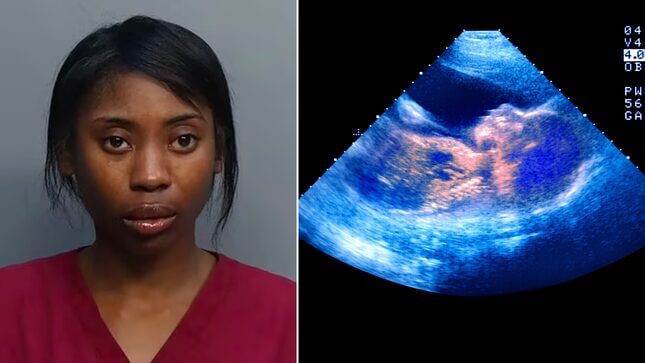Pregnant Florida Woman Facing Murder Charges Seeks Early Jail Release Because Her ‘Unborn Child’ Is Innocent
The argument that imprisoning a pregnant person violates their fetus' rights isn't new and just opens the door for fetal personhood.
EntertainmentEntertainment

A 24-year-old pregnant woman in Florida is seeking early release from jail, where she’s being held on murder charges, as she claims her now-8-month-old fetus “has not been charged with a criminal offense,” the Miami Herald first reported last week. The woman, Natalia Harrell, has been in the custody of the Miami-Dade jail system since last July, when she allegedly shot and killed a woman in an Uber during an argument after a night of partying. At the time, Harrell was six weeks pregnant.
Harrell’s lawyer, William M. Norris, made the argument that her fetus (and thus, Harrell) should be released from jail by putting forth a habeas corpus court filing on Thursday. Habeas corpus filings allege that someone is illegally detained, and in this filing, Norris specifically argues that Harrell’s fetus is being improperly jailed without any criminal charges. Throughout the filing, the fetus is referred to as “unborn child.” The Miami-Dade County Corrections and Rehabilitation Department motioned to dismiss the filing, and in response, on Tuesday, Norris argued again that Harrell’s fetus is a separate person being improperly jailed without legal recourse.
Norris further claimed in the Thursday court filing, titled “Petitioner unborn child’s writ of habeas corpus petition,” that over the last several months, Harrell has been neglected by the jail system and denied necessary prenatal care. According to Norris, the jail has “failed or refused to take UNBORN CHILD to the attending outside OB-GYN physician at Jackson Hospital” in recent months, and the last time Harrell was taken to see a physician was in October. Harrell’s due date is unclear, because no doctor has checked on her in months, nor has the jail provided “the prescribed vitamins and nutritional drinks to UNBORN CHILD’s mother, Ms. Harrell,” the filing alleges.
-

-

-

-

-

-

-

-

-

-

-

-

-

-

-

-

-

-

-

-

-

-

-

-

-

-

-

-

-

-

-

-

-

-

-

-

-

-

-

-








































